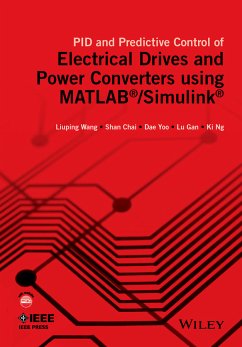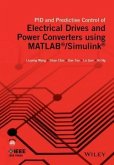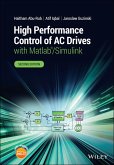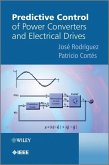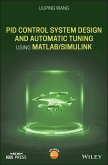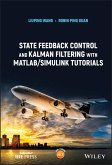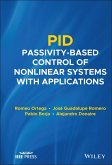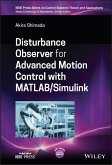PID and Predictive Control of Electrical Drives and Power Converters using MATLAB / Simulink (eBook, PDF)


Alle Infos zum eBook verschenken

PID and Predictive Control of Electrical Drives and Power Converters using MATLAB / Simulink (eBook, PDF)
- Format: PDF
- Merkliste
- Auf die Merkliste
- Bewerten Bewerten
- Teilen
- Produkt teilen
- Produkterinnerung
- Produkterinnerung

Hier können Sie sich einloggen

Bitte loggen Sie sich zunächst in Ihr Kundenkonto ein oder registrieren Sie sich bei bücher.de, um das eBook-Abo tolino select nutzen zu können.
A timely introduction to current research on PID and predictive control by one of the leading authors on the subject PID and Predictive Control of Electric Drives and Power Supplies using MATLAB/Simulink examines the classical control system strategies, such as PID control, feed-forward control and cascade control, which are widely used in current practice. The authors share their experiences in actual design and implementation of the control systems on laboratory test-beds, taking the reader from the fundamentals through to more sophisticated design and analysis. The book contains sections on…mehr
- Geräte: PC
- mit Kopierschutz
- eBook Hilfe
- Größe: 29.08MB
![PID and Predictive Control of Electrical Drives and Power Converters using MATLAB / Simulink (eBook, ePUB) PID and Predictive Control of Electrical Drives and Power Converters using MATLAB / Simulink (eBook, ePUB)]() Liuping WangPID and Predictive Control of Electrical Drives and Power Converters using MATLAB / Simulink (eBook, ePUB)123,99 €
Liuping WangPID and Predictive Control of Electrical Drives and Power Converters using MATLAB / Simulink (eBook, ePUB)123,99 €![High Performance Control of AC Drives with Matlab/Simulink (eBook, PDF) High Performance Control of AC Drives with Matlab/Simulink (eBook, PDF)]() Haitham Abu-RubHigh Performance Control of AC Drives with Matlab/Simulink (eBook, PDF)100,99 €
Haitham Abu-RubHigh Performance Control of AC Drives with Matlab/Simulink (eBook, PDF)100,99 €![Predictive Control of Power Converters and Electrical Drives (eBook, PDF) Predictive Control of Power Converters and Electrical Drives (eBook, PDF)]() Jose RodriguezPredictive Control of Power Converters and Electrical Drives (eBook, PDF)101,99 €
Jose RodriguezPredictive Control of Power Converters and Electrical Drives (eBook, PDF)101,99 €![PID Control System Design and Automatic Tuning using MATLAB/Simulink (eBook, PDF) PID Control System Design and Automatic Tuning using MATLAB/Simulink (eBook, PDF)]() Liuping WangPID Control System Design and Automatic Tuning using MATLAB/Simulink (eBook, PDF)119,99 €
Liuping WangPID Control System Design and Automatic Tuning using MATLAB/Simulink (eBook, PDF)119,99 €![State Feedback Control and Kalman Filtering with MATLAB/Simulink Tutorials (eBook, PDF) State Feedback Control and Kalman Filtering with MATLAB/Simulink Tutorials (eBook, PDF)]() Liuping WangState Feedback Control and Kalman Filtering with MATLAB/Simulink Tutorials (eBook, PDF)115,99 €
Liuping WangState Feedback Control and Kalman Filtering with MATLAB/Simulink Tutorials (eBook, PDF)115,99 €![PID Passivity-Based Control of Nonlinear Systems with Applications (eBook, PDF) PID Passivity-Based Control of Nonlinear Systems with Applications (eBook, PDF)]() Romeo OrtegaPID Passivity-Based Control of Nonlinear Systems with Applications (eBook, PDF)114,99 €
Romeo OrtegaPID Passivity-Based Control of Nonlinear Systems with Applications (eBook, PDF)114,99 €![Disturbance Observer for Advanced Motion Control with MATLAB / Simulink (eBook, PDF) Disturbance Observer for Advanced Motion Control with MATLAB / Simulink (eBook, PDF)]() Akira ShimadaDisturbance Observer for Advanced Motion Control with MATLAB / Simulink (eBook, PDF)107,99 €
Akira ShimadaDisturbance Observer for Advanced Motion Control with MATLAB / Simulink (eBook, PDF)107,99 €-
-
-
Dieser Download kann aus rechtlichen Gründen nur mit Rechnungsadresse in A, B, BG, CY, CZ, D, DK, EW, E, FIN, F, GR, HR, H, IRL, I, LT, L, LR, M, NL, PL, P, R, S, SLO, SK ausgeliefert werden.
- Produktdetails
- Verlag: Wiley-IEEE Press
- Seitenzahl: 360
- Erscheinungstermin: 17. Dezember 2014
- Englisch
- ISBN-13: 9781118339466
- Artikelnr.: 42045082
- Verlag: Wiley-IEEE Press
- Seitenzahl: 360
- Erscheinungstermin: 17. Dezember 2014
- Englisch
- ISBN-13: 9781118339466
- Artikelnr.: 42045082
- Herstellerkennzeichnung Die Herstellerinformationen sind derzeit nicht verfügbar.
Preface xv
Acknowledgment xix
List of Symbols and Acronyms xxi
1 Modeling of AC Drives and Power Converter 1
1.1 Space Phasor Representation 1
1.1.1 Space Vector for Magnetic Motive Force 1
1.1.2 Space Vector Representation of Voltage Equation 4
1.2 Model of Surface Mounted PMSM 5
1.2.1 Representation in Stationary Reference Frame 5
1.2.2 Representation in Synchronous Reference Frame 7
1.2.3 Electromagnetic Torque 8
1.3 Model of Interior Magnets PMSM 10
1.3.1 Complete Model of PMSM 11
1.4 Per Unit Model and PMSM Parameters 11
1.4.1 Per Unit Model and Physical Parameters 11
1.4.2 Experimental Validation of PMSM Model 12
1.5 Modeling of Induction Motor 13
1.5.1 Space Vector Representation of Voltage Equation of Induction Motor 13
1.5.2 Representation in Stationary Reference Frame 17
1.5.3 Representation in Reference Frame 17
1.5.4 Electromagnetic Torque of Induction Motor 19
1.5.5 Model Parameters of Induction Motor and Model Validation 19
1.6 Modeling of Power Converter 21
1.6.1 Space Vector Representation of Voltage Equation for Power Converter
22
1.6.2 Representation in Reference Frame 22
1.6.3 Representation in Reference Frame 23
1.6.4 Energy Balance Equation 24
1.7 Summary 25
1.8 Further Reading 25
References 25
2 Control of Semiconductor Switches via PWM Technologies 27
2.1 Topology of IGBT Inverter 28
2.2 Six-step Operating Mode 30
2.3 Carrier Based PWM 31
2.3.1 Sinusoidal PWM 31
2.3.2 Carrier Based PWM with Zero-sequence Injection 32
2.4 Space Vector PWM 35
2.5 Simulation Study of the Effect of PWM 37
2.6 Summary 40
2.7 Further Reading 40
References 40
3 PID Control System Design for Electrical Drives and Power Converters 41
3.1 Overview of PID Control Systems Using Pole-assignment Design Techniques
42
3.1.1 PI Controller Design 42
3.1.2 Selecting the Desired Closed-loop Performance 43
3.1.3 Overshoot in Reference Response 45
3.1.4 PID Controller Design 46
3.1.5 Cascade PID Control Systems 48
3.2 Overview of PID Control of PMSM 49
3.2.1 Bridging the Sensor Measurements to Feedback Signals (See the lower
part of Figure 3.6) 50
3.2.2 Bridging the Control Signals to the Inputs to the PMSM (See the top
part of Figure 3.6) 51
3.3 PI Controller Design for Torque Control of PMSM 52
3.3.1 Set-point Signals to the Current Control Loops 52
3.3.2 Decoupling of the Current Control Systems 53
3.3.3 PI Current Controller Design 54
3.4 Velocity Control of PMSM 55
3.4.1 Inner-loop Proportional Control of q-axis Current 55
3.4.2 Cascade Feedback Control of Velocity:P Plus PI 57
3.4.3 Simulation Example for P Plus PI Control System 59
3.4.4 Cascade Feedback Control of Velocity:PI Plus PI 61
3.4.5 Simulation Example for PI Plus PI Control System 63
3.5 PID Controller Design for Position Control of PMSM 64
3.6 Overview of PID Control of Induction Motor 65
3.6.1 Bridging the Sensor Measurements to Feedback Signals 67
3.6.2 Bridging the Control Signals to the Inputs to the Induction Motor 67
3.7 PID Controller Design for Induction Motor 68
3.7.1 PI Control of Electromagnetic Torque of Induction Motor 68
3.7.2 Cascade Control of Velocity and Position 70
3.7.3 Slip Estimation 73
3.8 Overview of PID Control of Power Converter 74
3.8.1 Bridging Sensor Measurements to Feedback Signals 75
3.8.2 Bridging the Control Signals to the Inputs of the Power Converter 76
3.9 PI Current and Voltage Controller Design for Power Converter 76
3.9.1 P Control of d-axis Current 76
3.9.2 PI Control of q-axis Current 77
3.9.3 PI Cascade Control of Output Voltage 79
3.9.4 Simulation Example 80
3.9.5 Phase Locked Loop 80
3.10 Summary 82
3.11 Further Reading 83
References 83
4 PID Control System Implementation 87
4.1 P and PI Controller Implementation in Current Control Systems 87
4.1.1 Voltage Operational Limits in Current Control Systems 87
4.1.2 Discretization of Current Controllers 90
4.1.3 Anti-windup Mechanisms 92
4.2 Implementation of Current Controllers for PMSM 93
4.3 Implementation of Current Controllers for Induction Motors 95
4.4 Current Controller Implementation for Power Converter 97
4.4.1 Constraints on the Control Variables 97
4.5 Implementation of Outer-loop PI Control System 98
4.5.1 Constraints in the Outer-loop 98
4.5.2 Over Current Protection for AC Machines 99
4.5.3 Implementation of Outer-loop PI Control of Velocity 100
4.5.4 Over Current Protection for Power Converters 100
4.6 MATLAB Tutorial on Implementation of PI Controller 100
4.7 Summary 102
4.8 Further Reading 103
References 103
5 Tuning PID Control Systems with Experimental Validations 105
5.1 Sensitivity Functions in Feedback Control Systems 105
5.1.1 Two-degrees of Freedom Control System Structure 105
5.1.2 Sensitivity Functions 109
5.1.3 Disturbance Rejection and Noise Attenuation 110
5.2 Tuning Current-loop q-axis Proportional Controller (PMSM) 111
5.2.1 Performance Factor and Proportional Gain 112
5.2.2 Complementary Sensitivity Function 112
5.2.3 Sensitivity and Input Sensitivity Functions 114
5.2.4 Effect of PWM Noise on Current Proportional Control System 114
5.2.5 Effect of Current Sensor Noise and Bias 116
5.2.6 Experimental Case Study of Current Sensor Bias Using P Control 118
5.2.7 Experimental Case Study of Current Loop Noise 119
5.3 Tuning Current-loop PI Controller (PMSM) 123
5.4 Performance Robustness in Outer-loop Controllers 128
5.4.1 Sensitivity Functions for Outer-loop Control System 131
5.4.2 Input Sensitivity Functions for the Outer-loop System 135
5.5 Analysis of Time-delay Effects 136
5.5.1 PI Control of q-axis Current 137
5.5.2 P Control of q-axis Current 137
5.6 Tuning Cascade PI Control Systems for Induction Motor 138
5.6.1 Robustness of Cascade PI Control System 140
5.6.2 Robustness Study Using Nyquist Plot 143
5.7 Tuning PI Control Systems for Power Converter 147
5.7.1 Overview of the Designs 147
5.7.2 Tuning the Current Controllers 149
5.7.3 Tuning Voltage Controller 150
5.7.4 Experimental Evaluations 154
5.8 Tuning P Plus PI Controllers for Power Converter 157
5.8.1 Design and Sensitivity Functions 157
5.8.2 Experimental Results 158
5.9 Robustness of Power Converter Control System Using PI Current
Controllers 159
5.9.1 Variation of Inductance Using PI Current Controllers 160
5.9.2 Variation of Capacitance on Closed-loop Performance 163
5.10 Summary 167
5.10.1 Current Controllers 167
5.10.2 Velocity, Position and Voltage Controllers 168
5.10.3 Choice between P Current Control and PI Current Control 169
5.11 Further Reading 169
References 169
6 FCS Predictive Control in d ¿ q Reference Frame 171
6.1 States of IGBT Inverter and the Operational Constraints 172
6.2 FCS Predictive Control of PMSM 175
6.3 MATLAB Tutorial on Real-time Implementation of FCS-MPC 177
6.3.1 Simulation Results 179
6.3.2 Experimental Results of FCS Control 181
6.4 Analysis of FCS-MPC System 182
6.4.1 Optimal Control System 182
6.4.2 Feedback Controller Gain 184
6.4.3 Constrained Optimal Control 185
6.5 Overview of FCS-MPC with Integral Action 187
6.6 Derivation of I-FCS Predictive Control Algorithm 191
6.6.1 Optimal Control without Constraints 191
6.6.2 I-FCS Predictive Controller with Constraints 194
6.6.3 Implementation of I-FCS-MPC Algorithm 196
6.7 MATLAB Tutorial on Implementation of I-FCS Predictive Controller 197
6.7.1 Simulation Results 198
6.8 I-FCS Predictive Control of Induction Motor 201
6.8.1 The Control Algorithm for an Induction Motor 202
6.8.2 Simulation Results 204
6.8.3 Experimental Results 205
6.9 I-FCS Predictive Control of Power Converter 209
6.9.1 I-FCS Predictive Control of a Power Converter 209
6.9.2 Simulation Results 211
6.9.3 Experimental Results 214
6.10 Evaluation of Robustness of I-FCS-MPC via Monte-Carlo Simulations 215
6.10.1 Discussion on Mean Square Errors 216
6.11 Velocity and Position Control of PMSM Using I-FCS-MPC 218
6.11.1 Choice of Sampling Rate for the Outer-loop Control System 219
6.11.2 Velocity and Position Controller Design 223
6.12 Velocity and Position Control of Induction Motor Using I-FCS-MPC 224
6.12.1 I-FCS Cascade Velocity Control of Induction Motor 225
6.12.2 I-FCS-MPC Cascade Position Control of Induction Motor 226
6.12.3 Experimental Evaluation of Velocity Control 228
6.13 Summary 232
6.13.1 Selection of sampling interval 233
6.13.2 Selection of the Integral Gain 233
6.14 Further Reading 234
References 234
7 FCS Predictive Control in Reference Frame 237
7.1 FCS Predictive Current Control of PMSM 237
7.1.1 Predictive Control Using One-step-ahead Prediction 238
7.1.2 FCS Current Control in Reference Frame 239
7.1.3 Generating Current Reference Signals in Frame 240
7.2 Resonant FCS Predictive Current Control 241
7.2.1 Control System Configuration 241
7.2.2 Outer-loop Controller Design 242
7.2.3 Resonant FCS Predictive Control System 243
7.3 Resonant FCS Current Control of Induction Motor 247
7.3.1 The Original FCS Current Control of Induction Motor 247
7.3.2 Resonant FCS Predictive Current Control of Induction Motor 250
7.3.3 Experimental Evaluations of Resonant FCS Predictive Control 252
7.4 Resonant FCS Predictive Power Converter Control 255
7.4.1 FCS Predictive Current Control of Power Converter 255
7.4.2 Experimental Results of Resonant FCS Predictive Control 260
7.5 Summary 261
7.6 Further Reading 262
References 262
8 Discrete-time Model Predictive Control (DMPC) of Electrical Drives and
Power Converter 265
8.1 Linear Discrete-time Model for PMSM 266
8.1.1 Linear Model for PMSM 266
8.1.2 Discretization of the Continuous-time Model 267
8.2 Discrete-time MPC Design with Constraints 268
8.2.1 Augmented Model 269
8.2.2 Design without Constraints 270
8.2.3 Formulation of the Constraints 272
8.2.4 On-line Solution for Constrained MPC 272
8.3 Experimental Evaluation of DMPC of PMSM 274
8.3.1 The MPC Parameters 274
8.3.2 Constraints 275
8.3.3 Response to Load Disturbances 275
8.3.4 Response to a Staircase Reference 277
8.3.5 Tuning of the MPC controller 278
8.4 Power Converter Control Using DMPC with Experimental Validation 280
8.5 Summary 281
8.6 Further Reading 282
References 283
9 Continuous-time Model Predictive Control (CMPC) of Electrical Drives and
PowerConverter 285
9.1 Continuous-time MPC Design 286
9.1.1 Augmented Model 286
9.1.2 Description of the Control Trajectories Using Laguerre Functions 287
9.1.3 Continuous-time Predictive Control without Constraints 289
9.1.4 Tuning of CMPC Control System Using Exponential Data Weighting and
Prescribed Degree of Stability 292
9.2 CMPC with Nonlinear Constraints 294
9.2.1 Approximation of Nonlinear Constraint Using Four Linear Constraints
294
9.2.2 Approximation of Nonlinear Constraint Using Sixteen Linear
Constraints 294
9.2.3 State Feedback Observer 297
9.3 Simulation and Experimental Evaluation of CMPC of Induction Motor 298
9.3.1 Simulation Results 298
9.3.2 Experimental Results 300
9.4 Continuous-time Model Predictive Control of Power Converter 301
9.4.1 Use of Prescribed Degree of Stability in the Design 302
9.4.2 Experimental Results for Rectification Mode 303
9.4.3 Experimental Results for Regeneration Mode 303
9.4.4 Experimental Results for Disturbance Rejection 304
9.5 Gain Scheduled Predictive Controller 305
9.5.1 The Weighting Parameters 305
9.5.2 Gain Scheduled Predictive Control Law 307
9.6 Experimental Results of Gain Scheduled Predictive Control of Induction
Motor 309
9.6.1 The First Set of Experimental Results 309
9.6.2 The Second Set of Experimental Results 311
9.6.3 The Third Set of Experimental Results 312
9.7 Summary 312
9.8 Further Reading 313
References 313
10 MATLAB®/Simulink® Tutorials on Physical Modeling and Test-bed Setup 315
10.1 Building Embedded Functions for Park-Clarke Transformation 315
10.1.1 Park-Clarke Transformation for Current Measurements 316
10.1.2 Inverse Park-Clarke Transformation for Voltage Actuation 317
10.2 Building Simulation Model for PMSM 318
10.3 Building Simulation Model for Induction Motor 320
10.4 Building Simulation Model for Power Converter 325
10.4.1 Embedded MATLAB Function for Phase Locked Loop (PLL) 325
10.4.2 Physical Simulation Model for Grid Connected Voltage Source
Converter 328
10.5 PMSM Experimental Setup 332
10.6 Induction Motor Experimental Setup 334
10.6.1 Controller 334
10.6.2 Power Supply 334
10.6.3 Inverter 335
10.6.4 Mechanical Load 335
10.6.5 Induction Motor and Sensors 335
10.7 Grid Connected Power Converter Experimental Setup 335
10.7.1 Controller 335
10.7.2 Inverter 336
10.7.3 Sensors 336
10.8 Summary 337
10.9 Further Reading 337
References 337
Index 339
Preface xv
Acknowledgment xix
List of Symbols and Acronyms xxi
1 Modeling of AC Drives and Power Converter 1
1.1 Space Phasor Representation 1
1.1.1 Space Vector for Magnetic Motive Force 1
1.1.2 Space Vector Representation of Voltage Equation 4
1.2 Model of Surface Mounted PMSM 5
1.2.1 Representation in Stationary Reference Frame 5
1.2.2 Representation in Synchronous Reference Frame 7
1.2.3 Electromagnetic Torque 8
1.3 Model of Interior Magnets PMSM 10
1.3.1 Complete Model of PMSM 11
1.4 Per Unit Model and PMSM Parameters 11
1.4.1 Per Unit Model and Physical Parameters 11
1.4.2 Experimental Validation of PMSM Model 12
1.5 Modeling of Induction Motor 13
1.5.1 Space Vector Representation of Voltage Equation of Induction Motor 13
1.5.2 Representation in Stationary Reference Frame 17
1.5.3 Representation in Reference Frame 17
1.5.4 Electromagnetic Torque of Induction Motor 19
1.5.5 Model Parameters of Induction Motor and Model Validation 19
1.6 Modeling of Power Converter 21
1.6.1 Space Vector Representation of Voltage Equation for Power Converter
22
1.6.2 Representation in Reference Frame 22
1.6.3 Representation in Reference Frame 23
1.6.4 Energy Balance Equation 24
1.7 Summary 25
1.8 Further Reading 25
References 25
2 Control of Semiconductor Switches via PWM Technologies 27
2.1 Topology of IGBT Inverter 28
2.2 Six-step Operating Mode 30
2.3 Carrier Based PWM 31
2.3.1 Sinusoidal PWM 31
2.3.2 Carrier Based PWM with Zero-sequence Injection 32
2.4 Space Vector PWM 35
2.5 Simulation Study of the Effect of PWM 37
2.6 Summary 40
2.7 Further Reading 40
References 40
3 PID Control System Design for Electrical Drives and Power Converters 41
3.1 Overview of PID Control Systems Using Pole-assignment Design Techniques
42
3.1.1 PI Controller Design 42
3.1.2 Selecting the Desired Closed-loop Performance 43
3.1.3 Overshoot in Reference Response 45
3.1.4 PID Controller Design 46
3.1.5 Cascade PID Control Systems 48
3.2 Overview of PID Control of PMSM 49
3.2.1 Bridging the Sensor Measurements to Feedback Signals (See the lower
part of Figure 3.6) 50
3.2.2 Bridging the Control Signals to the Inputs to the PMSM (See the top
part of Figure 3.6) 51
3.3 PI Controller Design for Torque Control of PMSM 52
3.3.1 Set-point Signals to the Current Control Loops 52
3.3.2 Decoupling of the Current Control Systems 53
3.3.3 PI Current Controller Design 54
3.4 Velocity Control of PMSM 55
3.4.1 Inner-loop Proportional Control of q-axis Current 55
3.4.2 Cascade Feedback Control of Velocity:P Plus PI 57
3.4.3 Simulation Example for P Plus PI Control System 59
3.4.4 Cascade Feedback Control of Velocity:PI Plus PI 61
3.4.5 Simulation Example for PI Plus PI Control System 63
3.5 PID Controller Design for Position Control of PMSM 64
3.6 Overview of PID Control of Induction Motor 65
3.6.1 Bridging the Sensor Measurements to Feedback Signals 67
3.6.2 Bridging the Control Signals to the Inputs to the Induction Motor 67
3.7 PID Controller Design for Induction Motor 68
3.7.1 PI Control of Electromagnetic Torque of Induction Motor 68
3.7.2 Cascade Control of Velocity and Position 70
3.7.3 Slip Estimation 73
3.8 Overview of PID Control of Power Converter 74
3.8.1 Bridging Sensor Measurements to Feedback Signals 75
3.8.2 Bridging the Control Signals to the Inputs of the Power Converter 76
3.9 PI Current and Voltage Controller Design for Power Converter 76
3.9.1 P Control of d-axis Current 76
3.9.2 PI Control of q-axis Current 77
3.9.3 PI Cascade Control of Output Voltage 79
3.9.4 Simulation Example 80
3.9.5 Phase Locked Loop 80
3.10 Summary 82
3.11 Further Reading 83
References 83
4 PID Control System Implementation 87
4.1 P and PI Controller Implementation in Current Control Systems 87
4.1.1 Voltage Operational Limits in Current Control Systems 87
4.1.2 Discretization of Current Controllers 90
4.1.3 Anti-windup Mechanisms 92
4.2 Implementation of Current Controllers for PMSM 93
4.3 Implementation of Current Controllers for Induction Motors 95
4.4 Current Controller Implementation for Power Converter 97
4.4.1 Constraints on the Control Variables 97
4.5 Implementation of Outer-loop PI Control System 98
4.5.1 Constraints in the Outer-loop 98
4.5.2 Over Current Protection for AC Machines 99
4.5.3 Implementation of Outer-loop PI Control of Velocity 100
4.5.4 Over Current Protection for Power Converters 100
4.6 MATLAB Tutorial on Implementation of PI Controller 100
4.7 Summary 102
4.8 Further Reading 103
References 103
5 Tuning PID Control Systems with Experimental Validations 105
5.1 Sensitivity Functions in Feedback Control Systems 105
5.1.1 Two-degrees of Freedom Control System Structure 105
5.1.2 Sensitivity Functions 109
5.1.3 Disturbance Rejection and Noise Attenuation 110
5.2 Tuning Current-loop q-axis Proportional Controller (PMSM) 111
5.2.1 Performance Factor and Proportional Gain 112
5.2.2 Complementary Sensitivity Function 112
5.2.3 Sensitivity and Input Sensitivity Functions 114
5.2.4 Effect of PWM Noise on Current Proportional Control System 114
5.2.5 Effect of Current Sensor Noise and Bias 116
5.2.6 Experimental Case Study of Current Sensor Bias Using P Control 118
5.2.7 Experimental Case Study of Current Loop Noise 119
5.3 Tuning Current-loop PI Controller (PMSM) 123
5.4 Performance Robustness in Outer-loop Controllers 128
5.4.1 Sensitivity Functions for Outer-loop Control System 131
5.4.2 Input Sensitivity Functions for the Outer-loop System 135
5.5 Analysis of Time-delay Effects 136
5.5.1 PI Control of q-axis Current 137
5.5.2 P Control of q-axis Current 137
5.6 Tuning Cascade PI Control Systems for Induction Motor 138
5.6.1 Robustness of Cascade PI Control System 140
5.6.2 Robustness Study Using Nyquist Plot 143
5.7 Tuning PI Control Systems for Power Converter 147
5.7.1 Overview of the Designs 147
5.7.2 Tuning the Current Controllers 149
5.7.3 Tuning Voltage Controller 150
5.7.4 Experimental Evaluations 154
5.8 Tuning P Plus PI Controllers for Power Converter 157
5.8.1 Design and Sensitivity Functions 157
5.8.2 Experimental Results 158
5.9 Robustness of Power Converter Control System Using PI Current
Controllers 159
5.9.1 Variation of Inductance Using PI Current Controllers 160
5.9.2 Variation of Capacitance on Closed-loop Performance 163
5.10 Summary 167
5.10.1 Current Controllers 167
5.10.2 Velocity, Position and Voltage Controllers 168
5.10.3 Choice between P Current Control and PI Current Control 169
5.11 Further Reading 169
References 169
6 FCS Predictive Control in d ¿ q Reference Frame 171
6.1 States of IGBT Inverter and the Operational Constraints 172
6.2 FCS Predictive Control of PMSM 175
6.3 MATLAB Tutorial on Real-time Implementation of FCS-MPC 177
6.3.1 Simulation Results 179
6.3.2 Experimental Results of FCS Control 181
6.4 Analysis of FCS-MPC System 182
6.4.1 Optimal Control System 182
6.4.2 Feedback Controller Gain 184
6.4.3 Constrained Optimal Control 185
6.5 Overview of FCS-MPC with Integral Action 187
6.6 Derivation of I-FCS Predictive Control Algorithm 191
6.6.1 Optimal Control without Constraints 191
6.6.2 I-FCS Predictive Controller with Constraints 194
6.6.3 Implementation of I-FCS-MPC Algorithm 196
6.7 MATLAB Tutorial on Implementation of I-FCS Predictive Controller 197
6.7.1 Simulation Results 198
6.8 I-FCS Predictive Control of Induction Motor 201
6.8.1 The Control Algorithm for an Induction Motor 202
6.8.2 Simulation Results 204
6.8.3 Experimental Results 205
6.9 I-FCS Predictive Control of Power Converter 209
6.9.1 I-FCS Predictive Control of a Power Converter 209
6.9.2 Simulation Results 211
6.9.3 Experimental Results 214
6.10 Evaluation of Robustness of I-FCS-MPC via Monte-Carlo Simulations 215
6.10.1 Discussion on Mean Square Errors 216
6.11 Velocity and Position Control of PMSM Using I-FCS-MPC 218
6.11.1 Choice of Sampling Rate for the Outer-loop Control System 219
6.11.2 Velocity and Position Controller Design 223
6.12 Velocity and Position Control of Induction Motor Using I-FCS-MPC 224
6.12.1 I-FCS Cascade Velocity Control of Induction Motor 225
6.12.2 I-FCS-MPC Cascade Position Control of Induction Motor 226
6.12.3 Experimental Evaluation of Velocity Control 228
6.13 Summary 232
6.13.1 Selection of sampling interval 233
6.13.2 Selection of the Integral Gain 233
6.14 Further Reading 234
References 234
7 FCS Predictive Control in Reference Frame 237
7.1 FCS Predictive Current Control of PMSM 237
7.1.1 Predictive Control Using One-step-ahead Prediction 238
7.1.2 FCS Current Control in Reference Frame 239
7.1.3 Generating Current Reference Signals in Frame 240
7.2 Resonant FCS Predictive Current Control 241
7.2.1 Control System Configuration 241
7.2.2 Outer-loop Controller Design 242
7.2.3 Resonant FCS Predictive Control System 243
7.3 Resonant FCS Current Control of Induction Motor 247
7.3.1 The Original FCS Current Control of Induction Motor 247
7.3.2 Resonant FCS Predictive Current Control of Induction Motor 250
7.3.3 Experimental Evaluations of Resonant FCS Predictive Control 252
7.4 Resonant FCS Predictive Power Converter Control 255
7.4.1 FCS Predictive Current Control of Power Converter 255
7.4.2 Experimental Results of Resonant FCS Predictive Control 260
7.5 Summary 261
7.6 Further Reading 262
References 262
8 Discrete-time Model Predictive Control (DMPC) of Electrical Drives and
Power Converter 265
8.1 Linear Discrete-time Model for PMSM 266
8.1.1 Linear Model for PMSM 266
8.1.2 Discretization of the Continuous-time Model 267
8.2 Discrete-time MPC Design with Constraints 268
8.2.1 Augmented Model 269
8.2.2 Design without Constraints 270
8.2.3 Formulation of the Constraints 272
8.2.4 On-line Solution for Constrained MPC 272
8.3 Experimental Evaluation of DMPC of PMSM 274
8.3.1 The MPC Parameters 274
8.3.2 Constraints 275
8.3.3 Response to Load Disturbances 275
8.3.4 Response to a Staircase Reference 277
8.3.5 Tuning of the MPC controller 278
8.4 Power Converter Control Using DMPC with Experimental Validation 280
8.5 Summary 281
8.6 Further Reading 282
References 283
9 Continuous-time Model Predictive Control (CMPC) of Electrical Drives and
PowerConverter 285
9.1 Continuous-time MPC Design 286
9.1.1 Augmented Model 286
9.1.2 Description of the Control Trajectories Using Laguerre Functions 287
9.1.3 Continuous-time Predictive Control without Constraints 289
9.1.4 Tuning of CMPC Control System Using Exponential Data Weighting and
Prescribed Degree of Stability 292
9.2 CMPC with Nonlinear Constraints 294
9.2.1 Approximation of Nonlinear Constraint Using Four Linear Constraints
294
9.2.2 Approximation of Nonlinear Constraint Using Sixteen Linear
Constraints 294
9.2.3 State Feedback Observer 297
9.3 Simulation and Experimental Evaluation of CMPC of Induction Motor 298
9.3.1 Simulation Results 298
9.3.2 Experimental Results 300
9.4 Continuous-time Model Predictive Control of Power Converter 301
9.4.1 Use of Prescribed Degree of Stability in the Design 302
9.4.2 Experimental Results for Rectification Mode 303
9.4.3 Experimental Results for Regeneration Mode 303
9.4.4 Experimental Results for Disturbance Rejection 304
9.5 Gain Scheduled Predictive Controller 305
9.5.1 The Weighting Parameters 305
9.5.2 Gain Scheduled Predictive Control Law 307
9.6 Experimental Results of Gain Scheduled Predictive Control of Induction
Motor 309
9.6.1 The First Set of Experimental Results 309
9.6.2 The Second Set of Experimental Results 311
9.6.3 The Third Set of Experimental Results 312
9.7 Summary 312
9.8 Further Reading 313
References 313
10 MATLAB®/Simulink® Tutorials on Physical Modeling and Test-bed Setup 315
10.1 Building Embedded Functions for Park-Clarke Transformation 315
10.1.1 Park-Clarke Transformation for Current Measurements 316
10.1.2 Inverse Park-Clarke Transformation for Voltage Actuation 317
10.2 Building Simulation Model for PMSM 318
10.3 Building Simulation Model for Induction Motor 320
10.4 Building Simulation Model for Power Converter 325
10.4.1 Embedded MATLAB Function for Phase Locked Loop (PLL) 325
10.4.2 Physical Simulation Model for Grid Connected Voltage Source
Converter 328
10.5 PMSM Experimental Setup 332
10.6 Induction Motor Experimental Setup 334
10.6.1 Controller 334
10.6.2 Power Supply 334
10.6.3 Inverter 335
10.6.4 Mechanical Load 335
10.6.5 Induction Motor and Sensors 335
10.7 Grid Connected Power Converter Experimental Setup 335
10.7.1 Controller 335
10.7.2 Inverter 336
10.7.3 Sensors 336
10.8 Summary 337
10.9 Further Reading 337
References 337
Index 339
